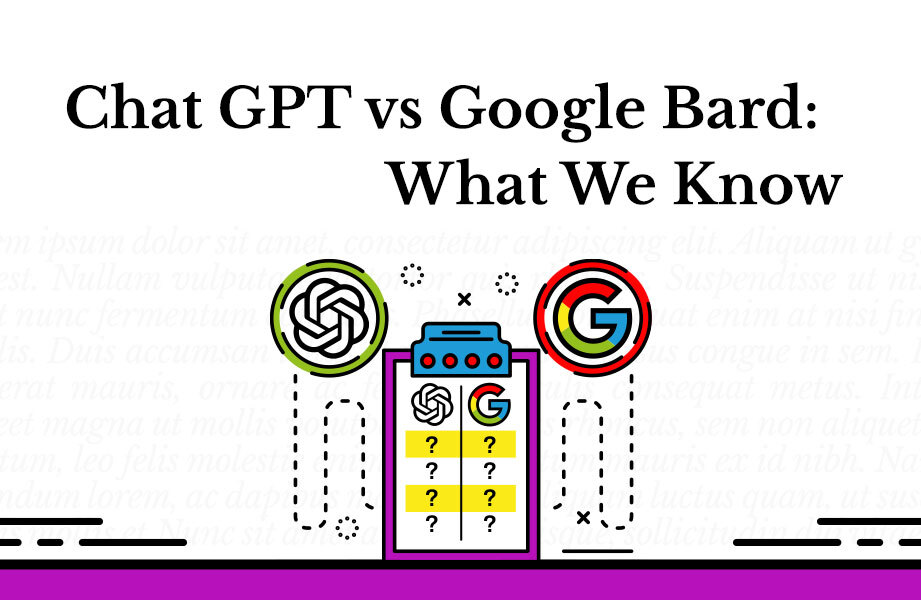In the news cycle, ChatGPT seems inescapable with people on both sides of the spectrum ready to either hold it up as the next tech golden child or decry it as the death of creativity. Meanwhile, in all of this, Google has announced its own foray into the AI generation space with its tool called Google Bard.
As a business with content as our cornerstone, and real human writers working every day to deliver the best content for our clients, let’s explore what we know about this tech, where it is going, and how it could change the nature of search and the internet at large.
What Do We Know About Google Bard?

We’ve spoken at length about ChatGPT previously, so as the newcomer, it’s worth giving Google Bard a close look. At its heart, Google Bard uses LaMDA which stands for Language Model for Dialogue Applications.
This is a little different than ChatGPT which generally has a lack of contextual knowledge. That lack of knowledge can make ChatGPT appear cold and even unlikable whereas LaMda hopes to be much more conversational and dare we say human-like. Once we get our hands on it, we can do a more thorough comparison of the two.
Is Google Bard Available?
The availability of Google Bard is pretty much null. Google said that it was launching in early February for beta testing, but there has been no registration process available as of yet. More likely than not, Google has released it to a select few people that it trusts to assist with the beta testing process. Perhaps this can be attributed to Google Bard providing an incorrect answer during their debut demo.
This means that direct comparisons to ChatGPT are hard since we don’t know much beyond what we were shown. If the tech world has taught us anything, it’s that being shown a product and using a product are two very different things.
If Google Is Against AI in Search, Why did They Make One?
When Internet tech has something to say, Google is going to be in the conversation. Whether it’s VR, self-driving cars, email, or cloud computing, Google will at least build some tech and play around with viability.
Google doesn’t want content generated by AI to dominate their search platform as it goes against their own terms of service—at least currently. However, Google does at least want to learn more about this tech, which would make it easier to detect AI-generated content even from other platforms, but there could be an even bigger picture at play here.
On the other end of the spectrum, if Google Bard becomes the dominant AI, Google would have a firm grip on controlling the flow of AI content on its search platform. In a sense, if you tried to use a piece of Google Bard-generated content on your site, Google would very easily be able to figure out that it had created it for you and penalize your ranking. Even if the scenario doesn’t play out like that, Google Bard can have a place not just alongside their search engine platform but perhaps as their platform.
What Problem Do ChatGPT and Google Bard Solve?
If you have played around with ChatGPT or have seen how Google Bard has been used then it almost always boils down to getting an answer to a question. Is that not what a search engine already does? At Phantom Copy, we’ve long believed in the power of long-tail keywords. These keywords are ones that often ask a question. “What colors does the 2024 Kia Soul come in?” is a prime example.
Compare that with how people have interacted with ChatGPT. You start by asking a question or giving it a request, much like you would Google or any other search engine. It’s just more detailed and personalized in its answer. This is likely the real driving force behind Google Bard. As proof of that concept, one only needs to look at Bing’s integration with ChatGPT to know that AI-generated content and answers are going to be at least a feature and perhaps a cornerstone of search in the coming future.
What Will That Means For Traffic?
If the AIs are providing all the answers, will people ever go to your site again? We’ve been here before. Does anyone remember the featured snippet? It’s nearly the same thing in reality. Not so long ago many people—even SEO experts—thought snippets were going to be the death of traffic. It turned out the opposite was true and now getting a featured snippet is something to be celebrated.
Read More: How Long Does Content Marketing Take to Make a Difference?
Perhaps in the not-so-distant future, people will be clamoring to have their content included in AI-generated responses. As long as there is attribution, which search engines will want to do eventually to ensure the ongoing viability of their platforms, then your website traffic will be just fine.
Ultimately, AI-generated content still won’t be able to provide goods and services which is why you want people on your site in the first place. As long as you make sure you still have human writers painstakingly creating your content, like those at Phantom Copy, you’ll come out on top no matter what the AIs are doing.
